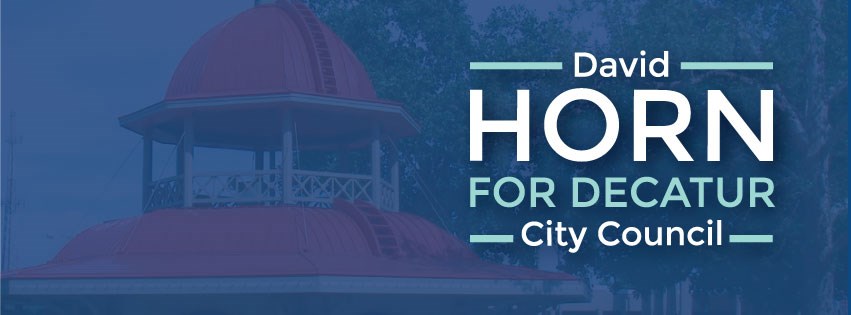
Decatur's longstanding racial and socioeconomic inequality laid bare by COVID-19 necessitates a new path forward
The tragic and unjust death of Mr. George Floyd is another horrific example of the disregard for human life that some have for Black Americans. Mr. Floyd’s senseless death and those of too many others also exposes the institutional racism found in many cities in America. It is time for the Decatur City Council to facilitate courageous and aspirational action that will create a city that is inclusive, equitable, and safe for all.
INSTITUTIONAL RACISM
The National League of Cities defines institutional racism as: “Policies, practices and procedures that work better for white people than for people of color, often unintentionally or inadvertently.” As the legislative body of the city of Decatur, it is the city council’s responsibility to ensure that policies, programs, and ordinances are free of institutional racism (and do not erect barriers to escaping poverty). If the council maintains or creates (unintentionally or inadvertently) institutionally racist policies, we will negatively impact our citizens and put Decatur police officers in an untenable position of enforcing unequitable public policy. For example, at one point in time, city policy called for the towing of vehicles after the first offense for noise violations, a policy that may have disproportionately impacted Black Americans (the policy has since been changed).
CITY COUNCIL DECISIONS THAT MAY HAVE DISPROPORTIONATE IMPACTS BASED ON RACE OR SOCIOECONOMIC LEVEL
Slow progress on neighborhood revitalization – Neighborhood revitalization is considered the city’s top priority. However, despite repeated requests, the city has not developed a comprehensive plan and budget, nor has it identified funding sources commensurate with the scope of this initiative. In fact, the city’s neighborhood revitalization initiatives have not kept pace with the rate of blight. Year to date through April, 765 nuisance violations were issued, 110 properties were declared unfit for human habitation, 56 properties were boarded up, and the number of houses on the demolition list increased from 172 to 192.
While the city has accomplished many significant infrastructure projects in recent years, including dredging Lake Decatur ($92 million project not including interest and fees) and rehabilitation of sanitary sewers (tens of millions of dollars), it has not kept pace with the blight of the city, let alone secured funding to restore the neighborhoods most in need. Many of these neighborhoods have a disproportionate number of minorities or those in a lower socioeconomic level.
Adding items to city council agenda - In April 2017, the council voted to approve a process making it more difficult for items to be placed on the council agenda, thereby making it more difficult to discuss certain issues. Under the current system, which was reaffirmed in 2019, agenda items require the consent of the Mayor, City Manager, or 4 of the 6 remaining council members. The effect of this policy has been to reduce the ability of minority voices to be heard and for important issues to be discussed. For example, a study session on the Minority Business Enterprise ordinance was requested in December 2019. This would have allowed city council members to evaluate the effectiveness of the ordinance since it was established and make modifications as necessary prior to projects going out to bid in 2020. To date, no update on the MBE ordinance has been provided to council members.
Prohibition of a cannabis dispensary - The city council’s decisions to prohibit cannabis dispensaries, prohibit other cannabis-related businesses, and prohibit public consumption in tobacco shops, makes access to legal cannabis more difficult. Will this result in individuals with fewer means making illegal purchases of cannabis and exacerbate racial disparities as it pertains to cannabis? How is the safety of cannabis users impacted, particularly lower income individuals, when they do not have access to a legal, regulated product? Could the sales tax revenue from a dispensary and property tax revenue from other cannabis-related businesses have been invested in neighborhoods where there are currently large racial and economic disparities?
MANY STRATEGIES AND POLICIES ADOPTED BY CITY COUNCIL IN 2019 SHOULD BE RECONSIDERED
The city council should reverse its decision to restrict the ability for public comment at council meetings. Eliminating the ability of citizens to comment after each agenda item was unnecessary, unjustified, and gives citizens reason to conclude that some council members are not interested in public participation or diverse viewpoints. The city stated the new policies were to “make public meetings more efficient and to maintain civility and decorum throughout public meetings.” However, the city provided no evidence meetings were inefficient, and if the city wanted more “efficient” meetings, it should not be at the expense of less citizen participation. Often, the best input, expertise, and solutions come from our citizens and open communication is critical to good governance.
THE TIME IS NOW FOR THE CITY COUNCIL TO FACILITATE BOLD, ASPIRATIONAL, AND PROACTIVE ACTION
One of the council’s priority goals is to “Create a bold and aspirational vision for the future of Decatur …” There may be no better opportunity than now for collaborative, inclusive and shared action for the future of our city. Working together, we can and must lay the foundation for a city that is inclusive, equitable, and safe for all.
